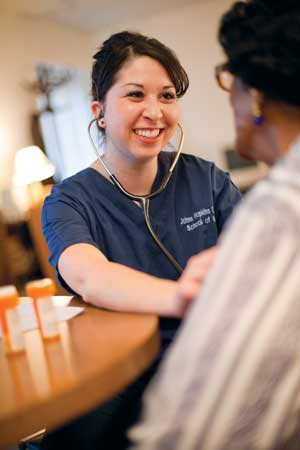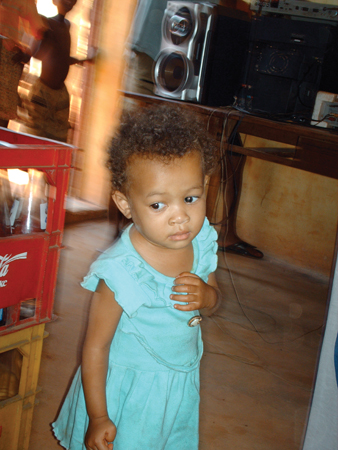Calling Someone by Name Makes all the Difference
by Mandy Chavez, Accelerated ’11

Angela and I were sitting on a bench outside my house, gently swinging our legs, as we did most days. She normally didn’t have any shoes on, but this day she was wearing purple sandals— worn and tattered with a faded picture of Barbie on them.
“I like your shoes,” I said.
“Thanks,” she replied. “Look, there is a vazaha on them.” Vazaha is the Malagasy word for “foreigner.” It’s a word that I heard over and over in Madagascar. At some point, I had given up trying to explain to people my name was Mandy and not vazaha.
“Oh, like Miss Mandy, huh?” I said, positive she would agree.
But she stopped, looked at me with confusion and replied, “You’re not a vazaha. You’re Miss Mandy,” and then continued swinging her feet.

Angela, a four-year-old girl, was able to teach me something that I have been able to bring with me into practice since starting the nursing program at Johns Hopkins. It’s important to see people. It’s important to remember that each one of our patients has a name and deserves to be treated as an individual.
Oftentimes, the medical problems patients have can be our exclusive focus. We can forget that under lists of past medical histories and medications, a mother, father, brother, sister, daughter, or son lies on that hospital bed. But we treat and care for patients—not the medical diagnoses.
I remember Angela when I am with a patient, and I consider how nice it was to be called Mandy and not vazaha. As I make my way through clinical rotations and meet patients hooked up to machines or unable to communicate with words, I will always think back to that day with Angela.
When I walk into a room to administer medications or do an assessment, I will look them in the eye and say “hello” to them before I check their I.D. band. I will remember how we all can appreciate being involved in the care and treatment in our lives and how a simple gesture, such as calling someone by their name, can make all the difference in the world.